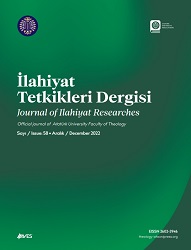İlk Vahyin Eğitimsel Yorumlarında İnsan Unsurunun İncelenmesi
Examining the Human Element in the Educational Interpretations of the First Revelation
Author(s): Yusuf Bahri Gündoğdu, Olcay BayraktarSubject(s): Hermeneutics, Philosophy of Education, Qur’anic studies
Published by: Atatürk Üniversitesi İlahiyat Fakültesi
Keywords: Education; Islamic Philosophy of Education; Educational Programs; Surah Alaq; Human Dignity;
Summary/Abstract: The first five verses of Surah Alaq, which is accepted as the first revelation of Islam, are interpreted more in terms of education through the command to "read." This command to read, repeated in verses one and three, is presented as a clear emphasis on reading and learning. The phrase “pen” in the fourth verse presents reading as well as writing as a part of the process. The relationship between the "Rabb" and "Tarbiyah" is also among the issues highlighted in the context of the first revelation when it comes to the etymology and definition of education. However, the basic element of education is human. While the first verses are examined in terms of education, this element is overlooked. From this point of view, "How was the human being, who is accepted as the basic element of education, handled in the first revelation that started the Islamic education process?" has been searched for answers to question. In this study, which was carried out through document analysis, it was examined how the mufassirs of the classical period handled the human element, which is the basis of education. The mufassirs, whose works were examined until the end of the 14th century, reached the conclusion of "human dignity" in their interpretations of the first two verses of Surah Alaq. The fact that human's high position in Islam is included in the first revelation is a message that Islamic education programs should be designed on the axis of "human dignity."
Journal: İlahiyat Tetkikleri Dergisi
- Issue Year: 2022
- Issue No: 58
- Page Range: 88-94
- Page Count: 7
- Language: Turkish

